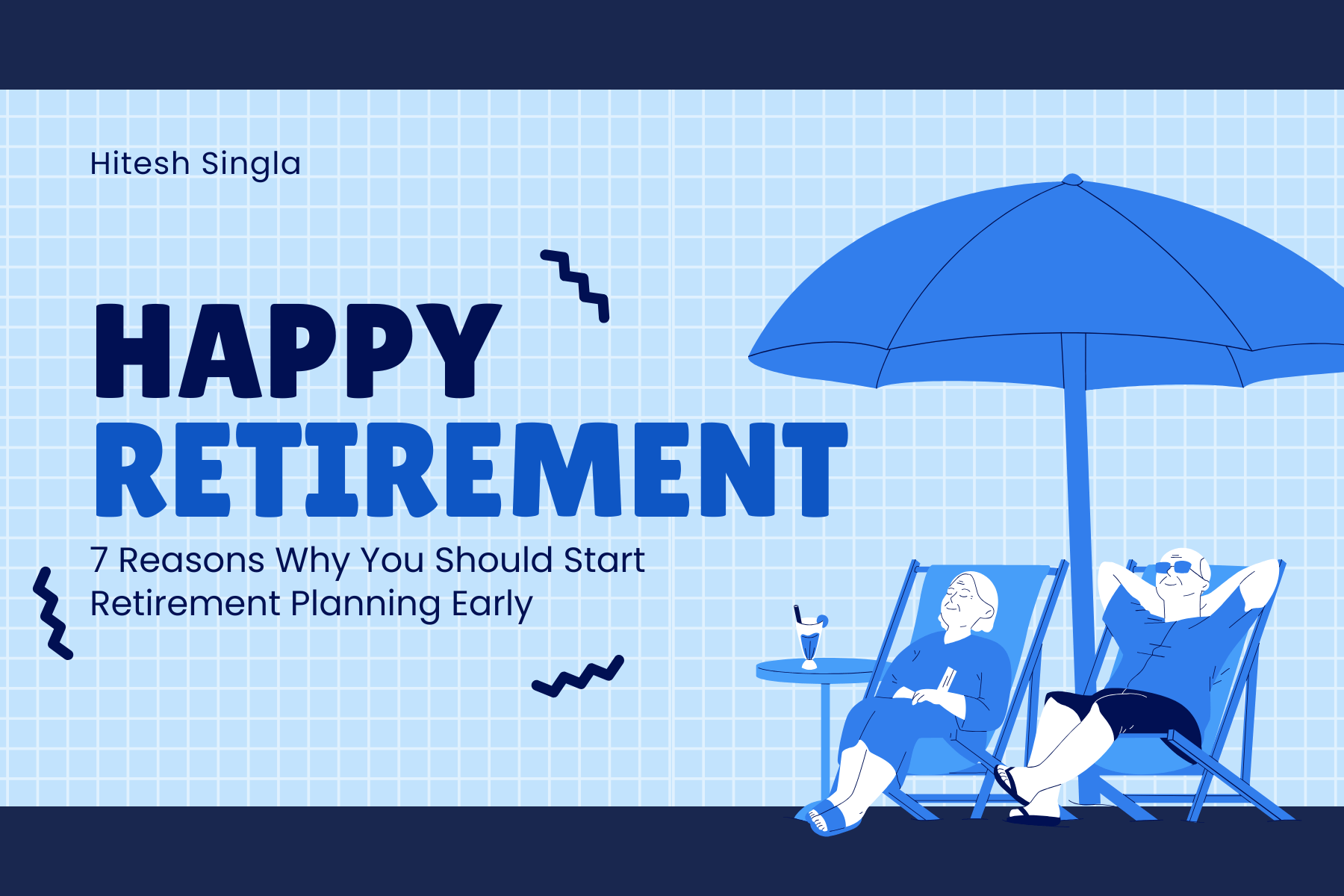7 Reasons Why You Should Start Retirement Planning Early
Retirement planning is often overlooked, especially by younger individuals. It is a key area of financial planning under wealth management. Most people would start to think about this in their late 40’s or mid 50’s. And this is the time when people have a lot of Financial responsibilities . The children are reaching higher education, they are planning to buy a house, etc. However, starting early can significantly benefit your future financial security. Here are seven compelling reasons to begin planning for your retirement as soon as possible:
1.The Power of Compound Interest
Albert Einstein said, “Compound interest is the eighth wonder of the world, he who understands it, earns it, he who doesn’t, pays it.
- The Earlier, the Better: The earlier you invest, the more time your money has to grow.
- The Magic of Compounding: Your initial investment earns interest, and then that interest earns interest, creating a snowball effect.
- Long-Term Gains: Over decades, this compounding effect can turn modest investments into substantial wealth.
Case Study :
- Mr Raj, he is early bird
- Age: 25
- Time till Retirement : 35 Years
- Monthly Savings for Retirement: Rs. 5,000
By the age of 60, i.e. 35 years hence , he would have accumulated a corpus of ₹1,69,93,955 at ROI @10%
- Mr Anil
- Age: 45
- Time till retirement : 15 years
- Monthly Saving for Retirement : Rs 15,000
By age of 60, i.e 15 years hence he would have accumulated a corpus ₹60,24,318.27 ROI @ 10%
Key Takeaway :
Though Mr Anil invested 3 times the amount of Mr Raj the early bird achieved a corpus of 2.5 times that of Mr. Anil.
2.Lower Monthly Contributions
- Spread the Load: Smaller, regular contributions over a longer period are less burdensome than larger lump sums later.
- Consistent Savings: Automate your savings to make it effortless and consistent.
Case Study :
If Mr Anil had to also achieve a corpus of lets say Rs ₹1,69,93,955 he would have to have to increase his SIP amount to ₹42,313 that 2.8 times at a time when his children would be going higher educations and all the responsibilities
Key Takeaway :
The earlier you start for the same amount you have to lower the amount , in this case Raj is investing just Rs 5,000 whereas Mr Anil has to invest about ₹42,313.
3.Reduced Investment Risk
- Time is Your Ally: A longer investment horizon allows you to ride out market fluctuations.
- Diversification: Spreading your investments across various asset classes reduces risk.
Case study :
Mr Anil is not able to increase his investment amount as he has other financial commitments , Home loans , car emis, Education of children. So he has asked if we increase the returns. TO keep the amount at the same he needs to increase his returns by 22%. But as he is 45 he does not want to risk much. He now needs his money to be stable rather than volatile.
But Mr Raj at such a young age can bear the risk he can increase his retirement corpus.
Key takeaway :
As you grow old you cannot take risk in your portfolio, you would not want to risk your capital at any cost. A young person can take more risk , and have a more volatile portfolio.
4.Achieving Financial Independence
- Early Retirement: With sufficient savings, you may be able to retire earlier than planned.
- Flexibility: Early retirement can provide more freedom and opportunities to pursue passions.
Case Study :
Mr Anil is not to increase his investment amount nor his risk profile, so he has to work longer to achieve his financial goal or retirement.
Whereas Mr Raj, he can increase his risk and even amounts of investment with time and reach his goal early. He can plan to retire at age of 50, and he can keep on investing the same amount at an ROI of 16%. And this can be achieved since he has age on his side.
Key takeaways:
Early starters can retire early , late starters have to increase the time and work for more time.
5.Social Security Benefits or Absence
In India we do not have any social security benefits , a government or PSU officer may be invested through pension scheme or NPS, and private sector employees may be doing EPS / NPS, but the corpus formed may not be sufficient though these. A self-employed person would only get an option to PPF. and some other schemes which are not sufficient to hold your investment in the later stage of life.
Case Study :
Dr Sandeep is a well known physician at a well established hospital, for his retirement he needs a corpus of Rs 5,00,00,000/- after 15 years. He looks at various options and finds that he does not have many options to invest and grow money and even none of the security benefits would be able to fulfill his retirement plan.
Key takeaway :
Start your retirement planning early in India. We do not have many special security benefits options to take care of you.
6. Increasing Average Life Expectancy
The life expectancy for India in 2023 was 70.42 years, a 0.33% increase from 2022. The life expectancy for India in 2022 was 70.19 years, a 0.33% increase from 2021. The life expectancy for India in 2021 was 69.96 years, a 0.33% increase from 2020. The above shows that life expectancy is increasing.
- Start early as you would live more and you would require more money to get you in your golden years
- Plan how much would be required as after retirement you would not have sources of income.
Key Takeaway : As life expectancy has increased for human beings , we need to be prepared for that increased life as you won’t have any other source of income to support you.
7. Avoiding Financial Stress
- Secure Future: A well-planned retirement can alleviate worries about financial security in your later years.
- Enjoyment of Life: Financial freedom allows you to enjoy retirement without stress or financial constraints.
Case Study : Mr Anil is under financial stress and he is not able to meet his goal of retirement. My Raj, an early start, is tension free as he knows he would be able to achieve these goals.
Conclusion :
Retirement planning has to be done and started at an early stage, probably the moment you start earning . The issues with retirement is that it does, any financial goal you can take a loan but retirement you cannot take any loan.
If you are planning to taker retirement planning journey, consider these steps:
- Assess Your Current Financial Situation: Evaluate your income, expenses, and debts.
- Set Clear Retirement Goals: Determine your desired retirement age and lifestyle.
- Create a Budget: Prioritize savings and track your spending.
- Choose Appropriate Investments: Consider a mix of stocks, bonds, and other assets.
- Seek Professional Advice: Consult with a financial advisor for personalized guidance.
Would you like to delve deeper into a specific aspect of retirement planning?
Reach out to us so we can help you plan your goal and achieve it in the long run. you can reach us : https://wa.me/message/LC5W5ZNTPSJ5L1)





